In some ways, President Joe Biden’s long-promised Summit for Democracy could not be better timed, POLITICO’s Nahal Toosi observes.
The virtual gathering, set for Thursday and Friday, comes as people from Cuba to Belarus have hit the streets in recent years to demand a say in their governance — or, at least, some accountability from their leaders. And it comes as Western leaders have grown increasingly wary of the tactics and intentions of the ruling Chinese Communist Party and alarmed about renewed Russian aggression toward Ukraine.
But the summit also is being held as the very concept of democracy appears unusually vulnerable. This past year alone has seen a half-dozen coups, from Myanmar to Sudan. …Studies and polls suggest global dissatisfaction with democracy has surged in recent years and that few people across the world see U.S. democracy as a good model.
 Those negatives, however, are just more reasons to hold the summit, advocates insist, Toosi adds.
Those negatives, however, are just more reasons to hold the summit, advocates insist, Toosi adds.
“It is precisely because there are so many challenges out there that a summit like this one is so timely and important,” said Derek Mitchell, a former U.S. ambassador to Myanmar who now leads the National Democratic Institute [a core institute of the National Endowment for Democracy (NED)]. “Convening global democratic leaders and others to reaffirm that democracy and democratic values remain the best answer to what ails us sends a message of solidarity, confidence, commitment and clarity.”
The Economist observes that the list of invitees to this week’s Summit reflects strategic considerations more than democratic values, resulting in “a tangle of contradictions and missed opportunities.”
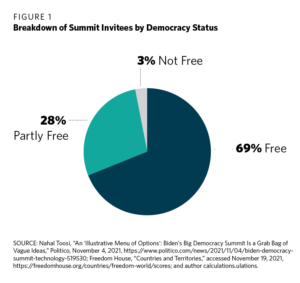
Credit: Carnegie
The White House has been less than clear about how it made such calls for the event, which is being overseen by Shanthi Kalathil, coordinator for democracy and human rights at the National Security Council, The Washington Post reports.
“I don’t think of this as the administration picking winners and losers as much as the administration trying to rally like-minded partners to fight the threat of authoritarianism, and also maybe trying to rally countries that are not doing well to do better,” said Michael J. Abramowitz, the president of Freedom House, a nonpartisan pro-democracy organization.
NDI’s Mitchell agreed. “My sense is this is not an initiative to create an exclusive club of democracy but to just celebrate this issue of democracy,” he told the Post. “But you can’t help geopolitics being here.”
It does not appear likely that the Biden administration will use the summit to “set out a truly novel paradigm for how the international community can work together to preserve democracy,” argues Yascha Mounk, Associate Professor at Johns Hopkins University, a Senior Fellow at the Council on Foreign Relations, and Founder of Persuasion.
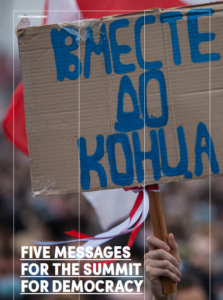 There are several reasons the administration’s attempts at democracy protection have, so far, turned out to be relatively toothless, he writes for Foreign Affairs:
There are several reasons the administration’s attempts at democracy protection have, so far, turned out to be relatively toothless, he writes for Foreign Affairs:
- The authoritarian resurgence is, at least in the short run, giving many American allies a genuine strategic alternative to a close partnership with the United States, making them less susceptible to pressure from the White House or the State Department.
- The United States needs to work with some of the countries that are experiencing the most pronounced forms of democratic backsliding to serve its key goals and interests, including climate change. (In an attempt to shore up an international alliance against China, the Biden administration has, for example, continued to draw closer to Vietnam’s autocratic one-party government.)
- U.S. officials are well aware that many of their foreign partners continue to eye the United States with deep skepticism in the wake of Trump’s presidency, making them highly—perhaps overly—cautious about standing up for democratic institutions.
- And most decisively, the administration simply does not seem to have a coherent plan for how to reshape the incentives of would-be authoritarian leaders in countries such as Poland or India.
Authoritarian learning
One reason why it’s important to have a global summit for democracy is that “the authoritarian states are comparing notes,” says CSIS analyst Michael J. Green. “They are repressing legitimate human rights movements, civil society organizations, and teaching each other how to do it,” he adds, citing a Shanghai Cooperation Organization, document, “How to Counter Color Revolutions.”
“So the fact that autocrats are sharing technology and learning from each other to defeat open societies is itself a very good reason why there needs to be a global summit of democracies on how we reinforce our norms and reinforce rights around the world,” he notes.
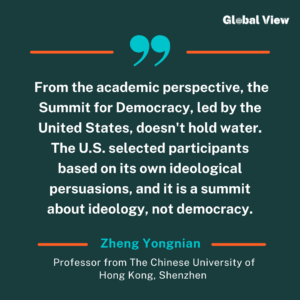
Credit: CCTV Screengrab
The summit has drawn attacks from autocratic states eager to undermine any prospects of democratic solidarity emerging in response to authoritarian collaboration. China’s tame ‘academic’ propagandists have dismissed the summit as an instrument to maintain US hegemony and an ideological exercise (right).
China’s propaganda offensive has produced some eyebrow-raising claims about the fundamental nature of Communist Party rule and the superiority of its political and social model. It also suggests that Beijing may be insecure about how it is perceived by the world, The Times reports.
“The fact that the regime feels the need to consistently justify its political system in terms of democracy is a powerful acknowledgment of the symbolism and legitimacy that the term holds,” said Sarah Cook, an analyst who covers China for Freedom House, an advocacy group in Washington.
China this week issued a paper lauding its model of “whole-process democracy” in an effort to both claim democratic legitimacy and undermine what they describe as the “Western model” of democratic governance.
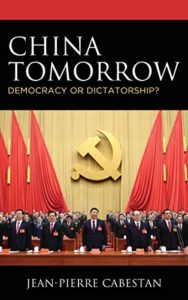 “They want to put on a back foot, put on the defensive, what they refer to as Western democracy,” said Jean-Pierre Cabestan, a political scientist at Hong Kong Baptist University and author of the book, China Tomorrow: Democracy or Dictatorship?
“They want to put on a back foot, put on the defensive, what they refer to as Western democracy,” said Jean-Pierre Cabestan, a political scientist at Hong Kong Baptist University and author of the book, China Tomorrow: Democracy or Dictatorship?
According to Mounk, a contributor to the NED’s Journal of Democracy, a meaningful democracy agenda would require the US to
- demonstrate that populist leaders who are assaulting their countries’ free institutions will reap serious adverse consequences, not an invitation to the White House’s Summit for Democracy;
- commit to prioritizing cooperation with true democracies while, of course, maintaining a lesser form of partnership with other allies;
- require the president to set out a vision for how international institutions that are being subverted by antidemocratic leaders in their own midst, such as NATO, can be reformed or refounded. RTWT
The Summit for Democracy allows both governments and civil society actors, “to come together to identify ways to push back on the authoritarian tide we have seen rolling for the past 15 years,” adds Nicole Bibbins Sedaca, the Kelly and David Pfeil Fellow at the George W. Bush Institute (below).
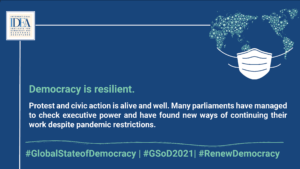 In the end, much will depend not on the summit itself, but whether the Biden administration uses it as a starting point to actively pursue a democracy agenda, for example by more forcefully speaking out whenever leaders such as Brazil’s Jair Bolsonaro embrace authoritarian tactics – and making clear that violations of democratic rule would have concrete consequences for bilateral ties, the Getulio Vargas Foundation’s Oliver Stuenkel writes for Americas Quarterly. Unless the U.S. government is willing to do so, the summit’s impact will be negligible.
In the end, much will depend not on the summit itself, but whether the Biden administration uses it as a starting point to actively pursue a democracy agenda, for example by more forcefully speaking out whenever leaders such as Brazil’s Jair Bolsonaro embrace authoritarian tactics – and making clear that violations of democratic rule would have concrete consequences for bilateral ties, the Getulio Vargas Foundation’s Oliver Stuenkel writes for Americas Quarterly. Unless the U.S. government is willing to do so, the summit’s impact will be negligible.
International IDEA today launched its Global State of Democracy report with a presentation and discussion in Washington, DC, (above), featuring Kevin Casas-Zamora, Secretary-General of International IDEA; Seema Shah, Head of Democracy Assessment, International IDEA; Annika Silva-Leander, Head of North America, International IDEA; Johnny Walsh, Deputy Assistant Administrator for Democracy, Human Rights, and Governance, USAID; Thomas Carothers, Senior Vice President for Studies, Carnegie Endowment for International Peace; Thinzar Shun Lei Yi, Democracy Activist, Myanmar; with closing remarks from NED President and CEO Damon Wilson.
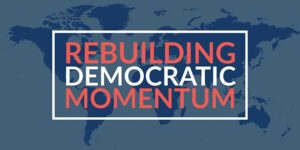 On the eve of the Summit for Democracy, the National Endowment for Democracy (NED) hosts a forum featuring some of the world’s most important voices from the frontlines of the democratic struggle, including this year’s Nobel Peace Prize winner, Philippine journalist Maria Ressa.
On the eve of the Summit for Democracy, the National Endowment for Democracy (NED) hosts a forum featuring some of the world’s most important voices from the frontlines of the democratic struggle, including this year’s Nobel Peace Prize winner, Philippine journalist Maria Ressa.
Activists from Hong Kong, Nicaragua, Nigeria, and Russia will discuss global challenges to democracy in conversation with US Legislators. Some of America’s most dedicated and experienced democracy advocates will share their insights and expertise on how to rebuild democratic momentum. Former heads of government who helped lead democratic change will reflect on how to sustain post-transition democracy. December 08, 2021. 12:30 pm – 02:00 pm. RSVP
Expanding Civic Space: Empowering Human Rights Defenders and Independent Media Within and Across Borders. NED President and CEO Damon Wilson will moderate an official Summit session, hosted by USAID Ambassador Samantha Power and the new Swedish Prime Minister Magdalena Andersson, alongside the presidents of Malawi and the Dominican Republic and civic activists – including NED partners – from Bangladesh, Burma, Egypt, and Lebanon. Friday, December 10, 2021 at 6:20 a.m. EST. Watch live here.
TOMORROW: #HurfordYouth alumni @velvetmarga (Chile) will appear live with US Sec of State @SecBlinken & other youth leaders from around the world as part of a #SummitforDemocracy discussion on youth participation in democracy. December 8th 7am EST https://t.co/bU9jglqk4V pic.twitter.com/GBXG0ka1fW
— World Movement (@MoveDemocracy) December 7, 2021







